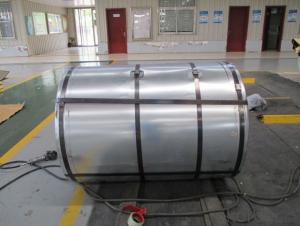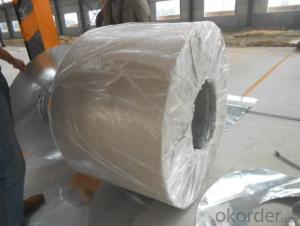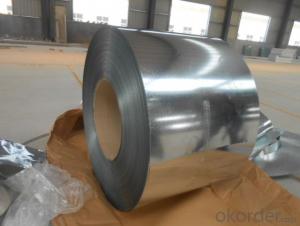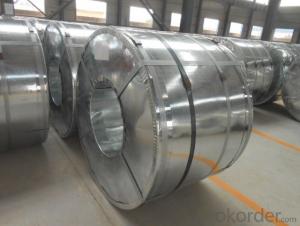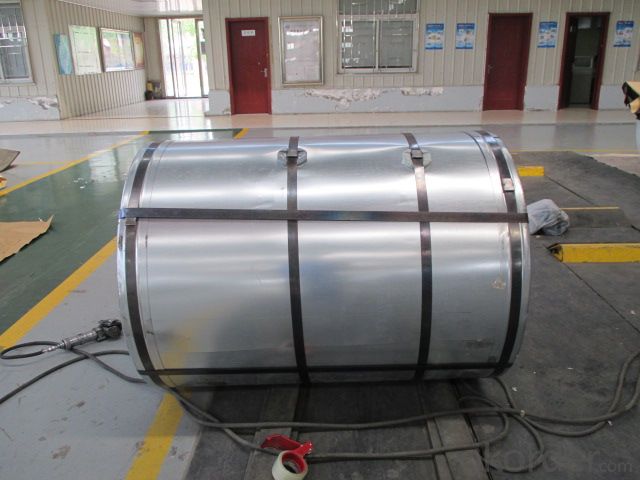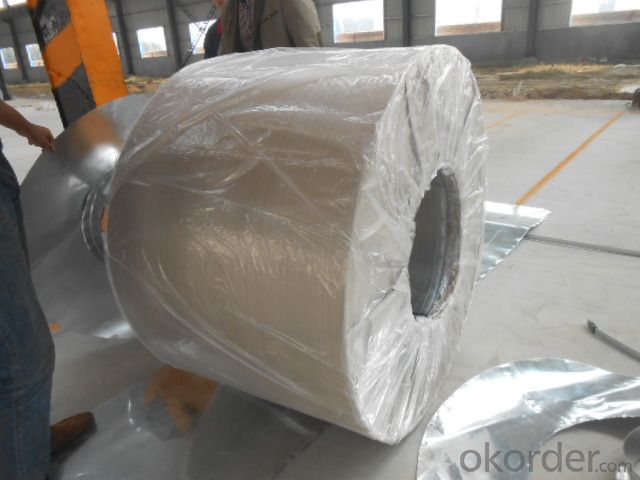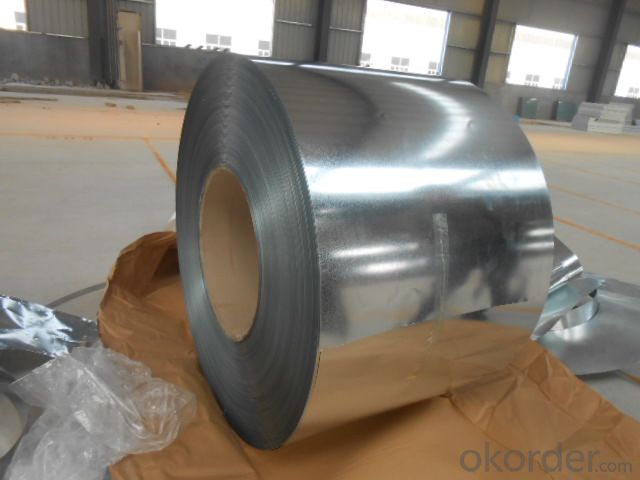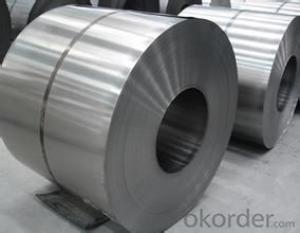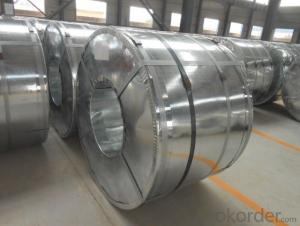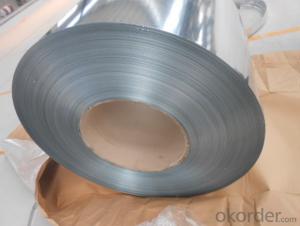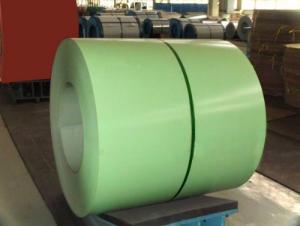PRIME GALVANIZED STEEL COIL JIS G 3302 SGCC WITH ZINC COATIONG Z06
- Loading Port:
- China main port
- Payment Terms:
- TT OR LC
- Min Order Qty:
- 25 m.t.
- Supply Capability:
- 10000 m.t./month
OKorder Service Pledge
OKorder Financial Service
You Might Also Like
Prime Galvanized steel coil
Packaging & Delivery
Packaging Detail: seaworthy export package
Delivery Detail: on request
Specifications
1. more than 10 years’ experience on this field
2. advanced equipments
3. competitive price
4. soonest delivery
Product Description :
Commodity
Hot dip galvanized steel coil
Technical Standard: JIS 3302 / ASTM A653 / EN10143/ GB/T 2518
Grade:DX51D/ S250,280,320GD,SGCC,SGHC,SGH340,SGH400,SGH440,G450,G550
Types:Commercial / Drawing / Deep Drawing / Structural quality
Width: 900mm/1000mm/1219mm/1200mm/1220mm/1250mm
Thickness: 0.2mm~4.0mm
Type of coating: galvanized
Zinc coating: Z40-275g/m2,Z40-Z450g/m2
Surface treatment: zero spangle / regular spangle/ big spangle
ID coil: 508mm or 610mm
Coil weight: 3-10/MT per coil
Package: Properly packed for ocean freight exportation in 20''container
Application:: home appliances, constructions, building, machineries
Our Advantages :
1. Expertise:
More than 10 years of manufacture: we know how to properly handle every step of production.
2. Competitive price:
We can offer competitive prices to our customers.
3. Accuracy:
We have excellent technicians and leaders, which can ensure our products are exactly what you want.
4. Materials:
All galvanized steel coils are made of high-quality raw materials.
5. Certificate:
Our products are certified by ISO9001.
6. Productivity:
We have large-scales of production lines,, which can guarantee all your orders will be finished in earliest time.
Hr CGL Technical Process:
Coil loading-> uncoiling-> cutting-> welding-> entry accumulator-> Heating and deoxidization-> galvanizing-> air cooling->water quenching-> air dryer-> tension leveler-> Passivation->air dryer->exit accumulator-> oiling-> cutting-> recoiling->coil unloading-> packing
The furnace heating style: improved Sendzimir heating technology
Hourly output: max.76.3t/h
Process after coating: tension leveling, Passivation or oiling
Our Service
Our quality
Test Equipments of Prepainted Galvanized Steel Coil : Salt-spray tester; Atomic absorption spectrophotometer; Rockwell typer hardness tester; Tensile test machine; Metrohm titration; Laboratory Bend test machine.
Our packing
Properly packed for ocean freight exportation in 20''container, galvanized metal fluted rings on inner and outer edges, galvanized metal & waterproof paper wall protection disk, galvanized metal & waterproof paper around circumference.
R&D department
R&D department concentrates on researching and developing reliable products with best quality. The quality department test and control every process of production to guarantee the best quality of products
- Q: I felt that my nylon strings don't sound as good as steel ones. Is it okay that I replace them with steel ones, even if my guitar is classical? Thanks.
- No, you will damage the guitar,it was not create to stand the force on the neck that steel strings will put on it.
- Q: What are the common defects found in steel coils?
- Some common defects found in steel coils include surface defects such as scratches, dents, and rust spots. Other defects may include coil breaks, which are cracks or breaks in the steel, as well as wavy edges, uneven thickness, and coil set, which is when the coil has a permanent curvature.
- Q: How are steel coils used in the production of industrial equipment?
- The utilization of steel coils is essential in the manufacturing of industrial equipment. These coils, which are large sheets of steel that are flat and rolled, serve as vital raw materials for various manufacturing processes. To begin with, steel coils are employed for the purpose of fabrication. They are cut, shaped, and welded together to form the structural framework of industrial equipment. This encompasses machinery, heavy-duty vehicles, storage tanks, and other components utilized in industries. The coils provide the necessary strength and durability to withstand the demanding conditions faced by industrial equipment. Furthermore, steel coils are frequently molded into specific shapes to produce various parts and components used in industrial machinery. These parts may include gears, shafts, bearings, brackets, and many others. The malleability of steel allows for easy manipulation and fabrication into different sizes and shapes, making it an ideal material for such applications. Moreover, steel coils are also utilized in the construction of industrial equipment, particularly in the production of boilers, heat exchangers, and pressure vessels. These coils are typically fashioned into tubes or pipes, which are then welded or brazed together to create the necessary structure for such equipment. The high strength and heat resistance properties of steel make it the preferred material for these applications, ensuring the safe and efficient operation of industrial processes. In conclusion, steel coils play a pivotal role in the manufacturing of industrial equipment. They serve as raw materials for fabrication, are transformed into parts and components, and are used in the construction of crucial equipment like boilers and pressure vessels. The durability, strength, and versatility of steel make it an indispensable material in the manufacturing industry.
- Q: How hot does steel have to get before it will melt?
- Type your query into Yahoo! Search or other search engines to get the answer: It depends, since steel usually has different metals added for various properties (strength, corrosive resistance, etc.)
- Q: What are the common methods of protecting steel coils from corrosion during storage?
- To safeguard steel coils from corrosion during storage, there are multiple commonly employed techniques. These methods aim to shield the steel coils from moisture and other environmental factors that could trigger corrosion. 1. VCI (Volatile Corrosion Inhibitor) Packaging: VCI packaging is extensively utilized for steel coil protection. It incorporates VCI materials into the packaging, such as plastic bags or films. These materials emit a vapor that forms a protective layer on the surface of the steel coils, effectively preventing the intrusion of moisture and corrosive agents. 2. Oil Coating: Another widely adopted approach involves applying a thin layer of oil onto the steel coil surface. This oil acts as a barrier, obstructing the contact between the steel and moisture or oxygen. It proves particularly effective for long-term storage or transportation situations. 3. Desiccants: Silica gel packets or similar desiccants can be placed inside the packaging to absorb any trapped moisture. By reducing humidity levels within the packaging, the risk of corrosion is minimized. This method is often combined with VCI packaging or oil coating. 4. Proper Ventilation: Adequate ventilation is crucial to prevent moisture buildup around the steel coils during storage. By facilitating the free circulation of air, humidity levels are reduced, and the formation of condensation, which can lead to corrosion, is prevented. 5. Controlled Environment: Storing steel coils in a controlled environment is an effective corrosion prevention measure. This entails maintaining constant temperature and humidity levels that are unfavorable for corrosion. Temperature and humidity control can be achieved using air conditioning or dehumidification systems. It should be noted that the choice of specific protection methods or combinations thereof depends on various factors, including storage duration, environmental conditions, and specific steel coil requirements. Regular inspections and maintenance are also vital to ensure ongoing corrosion protection.
- Q: What is the market demand for steel coils?
- The market demand for steel coils is influenced by various factors such as construction, manufacturing, and infrastructure development. As steel coils are widely used in industries like automotive, construction, and appliances, the market demand for steel coils is generally high. However, it can fluctuate depending on economic conditions, industry trends, and global demand for steel products.
- Q: How do steel coils contribute to energy performance in buildings?
- Steel coils contribute to energy performance in buildings primarily through their use in HVAC systems. Steel coils are commonly used in heating, ventilation, and air conditioning (HVAC) systems as heat exchangers or condenser coils. These coils help in transferring heat between the indoor and outdoor environments, allowing for effective heating or cooling of the building. The high thermal conductivity of steel enables efficient heat transfer, optimizing energy usage and enhancing the overall energy performance of the building. By facilitating appropriate temperature control and reducing energy consumption, steel coils play a vital role in improving the energy efficiency of buildings.
- Q: What are the different testing methods used for steel coils?
- There are several testing methods used for steel coils, including visual inspection, dimensional measurements, hardness testing, tensile testing, bend testing, and surface quality analysis. These methods help ensure the quality and compliance of steel coils with the specified standards and requirements.
- Q: I just started playing guitar last year. I never changed the chords. When my sister started taking guitar lessons her teacher said that she needed to change the chords. When i bought the guitar it came with steel strings but i bought nylon strings because they are easier on the fingers. The problem is i already tuned up the guitar but it sounds really bad like if it was not tuned. What can i do about this?
- Guitars okorder /
- Q: How are steel coils used in the production of steel chains?
- Steel coils are used in the production of steel chains as the raw material. These coils are fed into a machine called a chain-making machine, which shapes and cuts the steel into individual links. The links are then connected together to form the chain, creating a strong and durable product.
Send your message to us
PRIME GALVANIZED STEEL COIL JIS G 3302 SGCC WITH ZINC COATIONG Z06
- Loading Port:
- China main port
- Payment Terms:
- TT OR LC
- Min Order Qty:
- 25 m.t.
- Supply Capability:
- 10000 m.t./month
OKorder Service Pledge
OKorder Financial Service
Similar products
Hot products
Hot Searches
Related keywords
